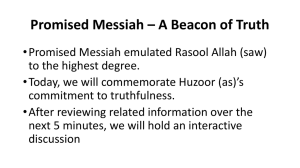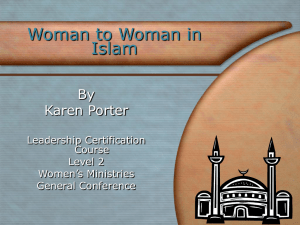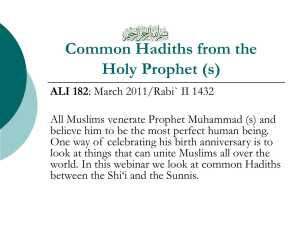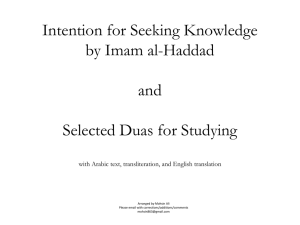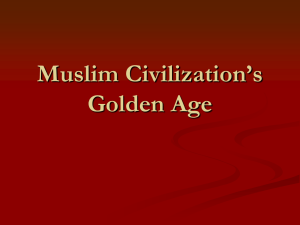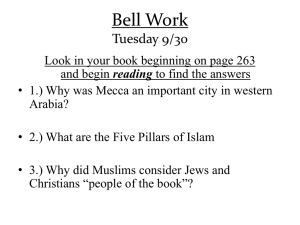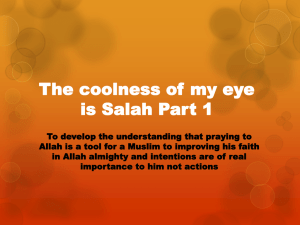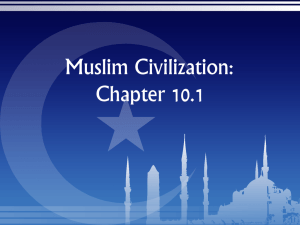English PowerPoint - Ahmadiyya Muslim Community
advertisement
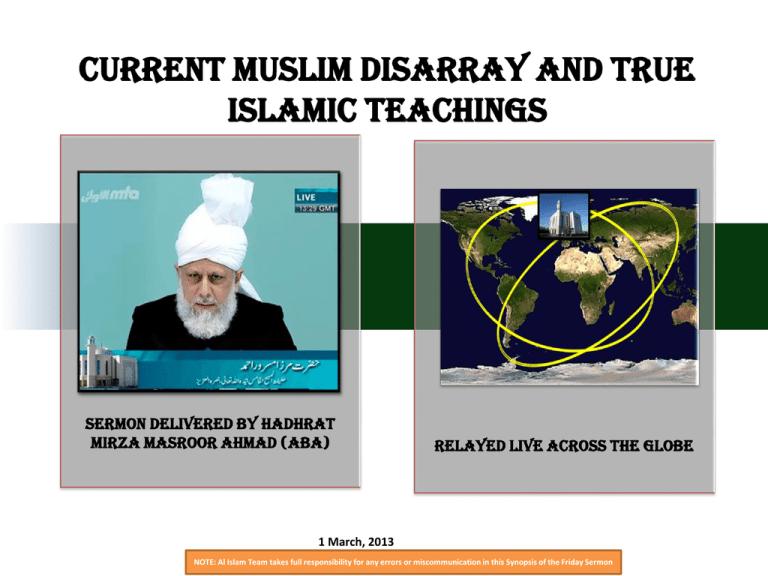
Current Muslim Disarray and True Islamic Teachings Sermon Delivered by Hadhrat Mirza Masroor Ahmad (aba) relayed live across the globe 1 March, 2013 NOTE: Al Islam Team takes full responsibility for any errors or miscommunication in this Synopsis of the Friday Sermon Summary True Believers Ahadith Prayers Funeral in absentia • State of muslim countries and the true islamic teachings. • important quality of Muslims is that they are ‘tender among themselves’ (48:30). • Hadhrat Khalifatul Masih related several Ahadith • Each person who believes in God and is ever desirous of having his sins pardoned should adopt the attribute of forgiveness and develop and enhance compassion to the fullest. • May the Ahmadiyya Community become the guarantor of world peace. • May the Muslims accept the Promised Messiah (on whom be peace) and understand the significance of mutual love. • Nasira Saleema Raza sahiba of Zion, USA passed away on 18 February. ‘And those who join what Allah has commanded to be joined, and fear their Lord, and dread the evil reckoning;’ (13:22). It is the sign of intelligent and true believers that they ‘join what Allah has commanded to be joined’ A true believer who has been granted discernment of faith cannot even imagine doing something that would be contrary to God’s pleasure. Once he makes a connection with God and according to God’s commandment makes other connections, he adheres to them forever. ‘And those who join what Allah has commanded to be joined, and fear their Lord, and dread the evil reckoning;’ (13:22). In explanation of this verse Hadhrat Musleh Maud (may Allah be pleased with him) has said that these are the people who, having attained excellence in their obedience and love of God, are drawn to God’s creation. In accordance with His commandments they forge connections of unity and benevolence with them. Khashiyyat Lexicons explain the word Khashiyyat as fear of losing something precious after one has attained comprehension into its beauty and excellence … this fear is not borne of loss or harm Rather it stems from a belief that one does not want to lose that thing due to one’s negligence. For a true believer such a thing can only be God and nothing else. True believers These people try to attain excellence in obedience and love of God because they fear Him and fear evil reckoning In their hearts they possess Khashiyyat, fear of God A true believer cannot bear to incur God’s displeasure. Once a true believer has attained God’s nearness, he is drawn towards’ God’s creation and is mindful of Khashiyyat and fear of reckoning through incurring God’s displeasure and by not paying dues of creation we see many people read the Holy Qur’an with translation and express their fear of God, they do not want to be among those who incur God’s displeasure, yet they do not pay the dues of God’s creation. They do not try to join connections in the real sense and this contradiction can be seen among the majority of Muslims. An important quality of Muslims that is stated is that they are ‘tender among themselves’ (48:30). Unfortunately, the rulers of Muslim countries totally ignore this obligation. This is because the personal gains have become more important than the desire to attain God’s pleasure And this is not happening in just any one Muslim country; in fact it is spread across almost the entire Muslim world, only differing in intensity from one place to another. Situation in Pakistan The Quranic verse describing Muslims as ‘tender among themselves’, also says they are ‘firm against non-believers’. The Ulema think they can make any one they wish a nonbeliever- a Kafir, and thus carry out whatever they wish against them, as if they have been given a licence to do what they want Each year hundreds or may be thousands are killed by suicide bombings in the name of God and faith According to newspaper reports dozens are killed every day. Those who pass Fatwa (edict) of Kufr (non-belief) in these instances themselves come under Fatwa of Kufr according to God and His Messenger Muslim Countries Afghanistan Muslims are waging war against Muslims and in the last ten years in excess of 50,000 lives have been lost. • In Syria where only Muslims are fighting each other, according to a cautious estimate 70,000 lives have been lost. Thousands were killed in Egypt in the name of revolution • In Libya too thousands were killed and continue to be killed In Iraq from 2003 to date more than 600,000 people have been killed and suicide bombing continue even now ‘tender among themselves’ ends with ‘…Allah has promised, unto those of them who believe and do good works, forgiveness and a great reward.’ (48:30) The correct Islamic approach to solve these problems of Islamic countries would have been for the organisation of Muslim countries to sit together without outside intervention and hold peace talks. Muslim countries need to understand their responsibilities . If there is a future world war it will start from the East and not the West If only they were to put in practice the commandment of: ‘Surely all believers are brothers. So make peace between brothers, and fear Allah that mercy may be shown to you.’ (49:11). Muslim Countries What kind of Islam is this? In Muslim countries where there is apparent peace, there too Muslim is killing Muslim. • It is most unfortunate that the more Islam draws attention towards good works and towards peace and conciliation, the worse the Muslims are becoming and more oppressors are being born among them Muslims are deemed the source of trouble in Christian countries • In terms of ratio of population there are more Muslims in prisons. It was indeed for the reformation of this deteriorated state of Muslims that the advent of the Promised Messiah (on whom be peace) was to take place and took place Farewell Sermon of the Holy Prophet (peace and blessings of Allah be on him) ‘Even as this month is sacred, this land inviolate, and this day holy, so has God made the lives, property and honour of every man sacred. To take any man's life or his property, or attack his honour, is as unjust and wrong as to violate the sacredness of this day, this month, and this territory. O people! you will surely meet your Lord soon and He will ask you of your works. Do not become disbelievers once again after me lest you start killing each other. What I have said to you, you should communicate to the ends of the earth. Maybe those who have not heard me may benefit by it more than those who have heard.’ d that the Prophet had indeed done so. Situation in Pakistan The message of the Holy Prophet (pbuh) and the practices of Muslims today are a world apart. Are they not culpable of blaspheming the Holy Prophet (peace and blessings of Allah be on him) by not only, not practicing his instructions? This cruelty will be perpetrated by each sect against each other once again. Shias are now becoming the target of the law that was promulgated against Ahmadis and in which everyone was involved The Holy Prophet (pbuh) also said that Muslim is one from whose hands and tongue other Muslims are safe It means that every peaceful person should be safe from a Muslim’s hand and tongue. This is a Taqwa-based insight into this hadith and the Ulema today do not have such insight. Time for self-reflection for Ahmadis! Do we fulfil the requirements as stated in both the verses (13:22 & 49:11 Everyone should self-reflect and gauge their condition Albeit our failings may be on a smaller scale but this is what leads to large-scale deterioration We are most desirous of God’s forgiveness and blessings for ourselves but do not know how to forgive others ‘…Let them forgive and forbear the offence. Do you not desire that Allah should forgive you? And Allah is Most Forgiving, Merciful.’ (24:23) The Promised Messiah (on whom be peace) said in this regard: ‘Forgive the sins of people and pardon their excesses and wrongs. Do you not wish that God too forgives you and pardons your sins? And He is Most Forgiving, Merciful.’ Hadhrat Khalifatul Masih (aba) stressed the importance of being kind and merciful as an Ahmadi. He said that if we adopt this teaching, most of family and marital difficulties will resolves. Ahadith Anas bin Malik relates that the Holy Prophet (peace and blessings of Allah be on him) said: ‘Anyone who wants to have his provision expanded, his term of life prolonged and for people to speak well of him should maintain ties of kinship.’ Amr bin Shuaib relates through his father and grandfather that the Holy Prophet (peace and blessings of Allah be on him) said: ‘He is not of us who does not have mercy on young children and does not recognise honour of the elderly.’ Abdullah bin Masood relates that the Holy Prophet (peace and blessings of Allah be on him) said: ‘All creatures are Allah's family; and Allah loves most among His creation those who treat his family well and look after their needs.' Ahadith Abdullah bin Amr relates that the Holy Prophet (peace and blessings of Allah be on him) said: ‘The Gracious God will have mercy on those who are merciful. Have mercy on those who are on earth, Allah in heavens will have mercy on you.’ Hadhrat Jabir (may Allah be pleased with him) relates that the Holy Prophet (peace and blessings of Allah be on him) said: ‘Allah will keep him in His protection and mercy and will grant him entry to Paradise who has these three qualities: He is compassionate to the weak, he loves his mother and father and treats his servants kindly Hadhrat ‘Aishah (may Allah be pleased with her) relates that the Holy Prophet (peace and blessings of Allah be on him) said: ‘Allah is gentle and He loves gentleness, and He rewards for gentleness what He does not recompense for harshness; and He does not reward any other virtue like He rewards gentleness.’ Ahadith Hadhrat ‘Aishah (may Allah be pleased with her) relates that the Holy Prophet (peace and blessings of Allah be on him) said: ‘Whenever gentleness is added to something, it adorns it and whenever it is withdrawn from something, it leaves it flawed.’ Ibne Masood relates that the Holy Prophet (peace and blessings of Allah be on him) said: ‘Shall I not tell you from whom Fire is kept away? It is kept away from everyone who is approachable to people, who is kind and is of an easy disposition.’ Hadhrat Khalifatul Masih (aba) said ‘Here I wish to especially draw the attention of Jama’at office holders that each one of them should have good attitude and compassionate sentiments; in particular the main Jama’at office-holders. It should always be remembered that no worker of the Jama’at should, under any circumstances, forsake courtesy…, effort should be made to facilitate as much help as possible and converse as gently as possible.’ Ahadith Hadhrat Abu Huraira (may Allah be pleased with him) relates that the Holy Prophet (peace and blessings of Allah be on him) said: ‘Wealth does not diminish by giving alms. Allah exalts one who forgives others. There is no humiliation in forgiving other’s fault.’ Hadhrat Anas (may Allah be pleased with him) relates that the Holy Prophet (peace and blessings of Allah be on him) said: ‘Do not have rancour for one another nor envy one another nor shun one another. Rather, lives as servants of Allah and as brothers. It is not lawful for a Muslim to refuse to speak to his brother for more than three days and to cut off ties with him.’ Ahadith Hadhrat Abu Huraira (may Allah be pleased with him) relates that the Holy Prophet (peace and blessings of Allah be on him) said: ‘Do not envy one another; do not inflate prices to incur loss to another, do not bear rancour with one another, do not turn away from one another, do not undercut one another. Rather, be Allah’s servants and brothers to each other. A Muslim does not oppress his brother nor does he hold contempt for him nor does he humiliate or disgrace him. Pointing to his breast, the Prophet said three times; Taqwa is here. It is evil enough for someone to look down with contempt at his Muslim brother. The life, property and honour of each Muslim are inviolable for every Muslim.’ Hadhrat Abu Huraira (may Allah be pleased with him) relates that the Holy Prophet (peace and blessings of Allah be on him) said: ‘Allah will say on the Day of Judgement: Where are those who loved one another for the sake of My glory and My greatness! Today when there is no shade but My shade, I shall give them shelter in My benevolent shade.’ Prayers May we increase our mutual love and compassion and become that community which the Promised Messiah (on whom be peace) wished to make, in light of the sayings of the Holy Prophet (peace and blessings of Allah be on him. May the Ahmadiyya Community also become the guarantor of world peace. May the Muslims accept the Promised Messiah (on whom be peace) and understand the significance of mutual love May the Muslims leaders stop their oppression of the public and are fair and just towards them and rather than be an instrument in the hands of those with vested interests the public has sense. May God soon rid the world in general and the Muslims in particular of the hold the horrendous extremists have on Muslim countries so that we are able to spreads the beautiful teaching of Islam in the world in a better way and with greater proficiency Funeral Prayer in absentia Nasira Saleema Raza sahiba of Zion, USA She was an Africanamerican ahmadi. Born in 1927 to the family of a Baptist priest she did not take any interest in Christianity. She was very keen on Tabligh work and would distribute leaflets and arrange for books and copies of the Holy Qur’an to be placed in libraries. She accepted Ahmadiyyat in 1949 and was married to late Nasir Ali Raza sahib in 1951. She served the Jama’at over a long period and was the regional Lajna sadr for many terms. By virtue of her Tabligh efforts more than fifty people accepted Ahmadiyyat. She was a cheerful person and was very well-liked among the ladies who visited her in great numbers and looked up to her as a mother figure. She exuded love of Islam. She would coach young girls about Purdah and other Islamic moral teachings and how to deal with bad customs of the West She did Tabligh to her mother for several years until her mother accepted Ahmadiyyat at the age of 85 which delighted her.

